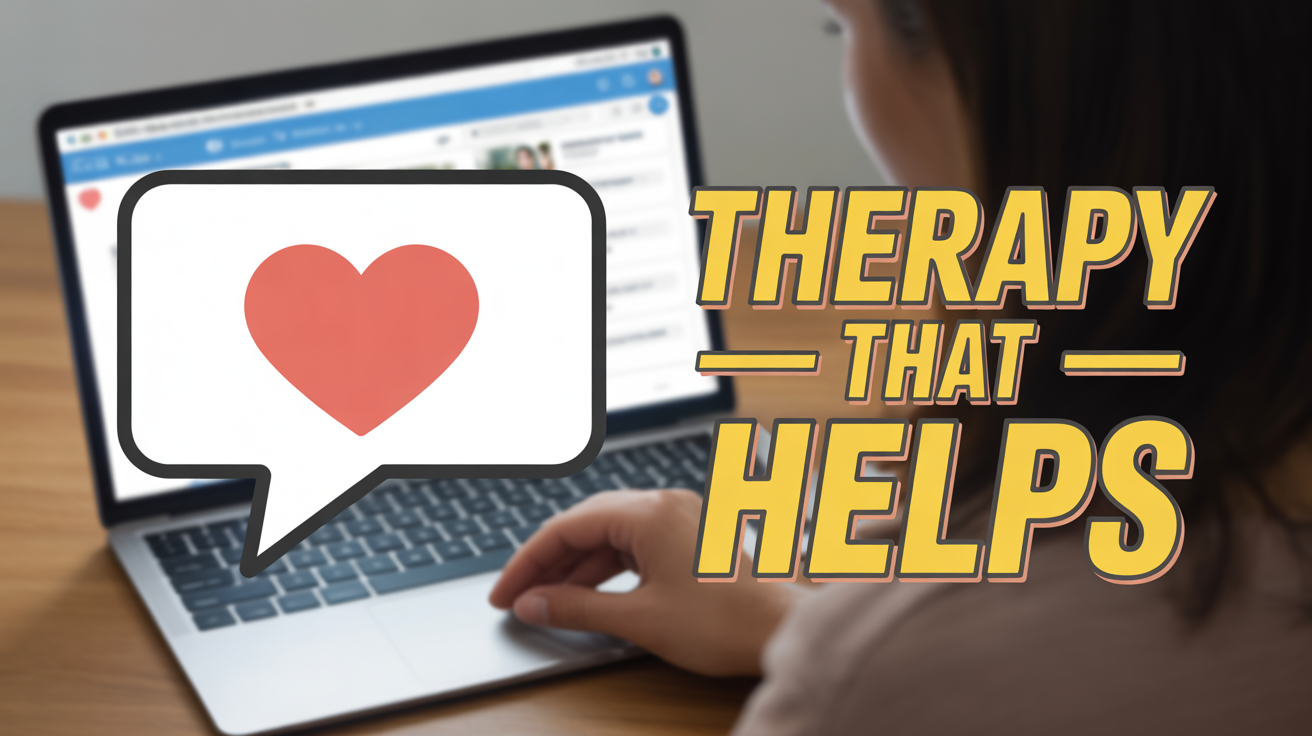Effective Online Therapy for Teens: How Virtual Mental Health Support Helps Adolescents
Online therapy for teens delivers licensed mental health support through secure telehealth platforms, enabling adolescents to improve emotional well-being from home. This article explains what online therapy involves, highlights its accessibility, confidentiality, specialized care and condition-specific applications, outlines parental support roles, and examines costs and insurance options. At adolescentmentalhealth.com, our virtual mental health programs combine evidence-based therapies with flexible scheduling to support teens facing anxiety, depression, ADHD, or trauma.
What Is Online Therapy for Teens and How Does It Work?
Online therapy for teens is a form of virtual counseling that connects adolescents with licensed mental health professionals via secure internet platforms. By leveraging video, chat, or phone sessions, these programs improve access to evidence-based treatments like CBT and DBT while reducing geographic and scheduling barriers. Understanding how sessions unfold clarifies the service’s structure and prepares families to engage.
What Does Online Therapy Involve for Adolescents?
- Initial Assessment: A licensed therapist evaluates mental health history and current concerns.
- Scheduled Sessions: Regularly timed video or chat meetings focus on coping skills and emotional regulation.
- Progress Reviews: Therapists track goals, adjust methods, and recommend resources.
These components build a structured virtual care plan that seamlessly transitions into the benefits of telehealth for busy teens.
How Do Teens Access Virtual Mental Health Programs?
Teens access virtual programs by registering on a secure portal, completing a digital intake form, and selecting convenient session times. After enrollment, families receive login credentials and a brief orientation to the platform’s interface. This streamlined onboarding process promotes immediate engagement and continuity of care.
What Are the Common Communication Methods in Online Therapy?
Online therapy uses video conferencing, real-time messaging, and telephone calls to deliver support.
| Communication Method | Platform Format | Primary Benefit |
|---|---|---|
| Video Conferencing | HIPAA-compliant video | Enhances nonverbal connection |
| Secure Messaging | In-app chat | Allows flexible, on-demand check-ins |
| Telephone Calls | Encrypted voice | Provides audio-only privacy and ease |
Each communication option lets teens choose the mode that best fits their comfort level before exploring mental health benefits.
What Are the Benefits of Online Therapy for Teen Mental Health?

Online therapy improves teen well-being by offering accessible, confidential, and specialized care. It reduces stigma, boosts consistency, and supports emotional resilience through engaging digital tools. These advantages underscore why virtual mental health support is transforming adolescent care.
How Does Online Therapy Improve Accessibility and Convenience?
Online therapy removes geographic barriers, allowing teens in rural or underserved areas to connect with specialists. Flexible scheduling accommodates busy school and extracurricular calendars. These accessibility gains pave the way for enhanced confidentiality in virtual settings.
This research supports the article’s claims about the accessibility and convenience benefits of online therapy for adolescents.
Why Is Confidentiality Important in Virtual Teen Therapy?
Confidentiality in online sessions protects teen privacy and encourages open dialogue. Secure encryption and private virtual “rooms” ensure that personal disclosures remain between the adolescent and therapist, fostering trust and deeper engagement in treatment.
This citation reinforces the importance of confidentiality in online therapy, as highlighted in the article.
How Does Specialized Care Support Teen Anxiety and Depression?
Licensed therapists with adolescent expertise apply targeted approaches such as CBT for anxiety reduction and interpersonal therapy for depression. This specialized care promotes symptom relief, coping skill building, and long-term emotional regulation, directly supporting improved teen mental health.
Which Teen Mental Health Issues Can Online Therapy Address?
Online therapy effectively treats a range of adolescent conditions by applying tailored virtual interventions. Digital platforms adapt evidence-based methods to meet each teen’s unique mental health needs, creating measurable progress across disorders.
| Condition | Treatment Approach | Expected Outcome |
|---|---|---|
| Anxiety Disorders | Cognitive Behavioral Therapy | Reduced worry and improved coping skills |
| Depression | Interpersonal Therapy | Enhanced mood and social engagement |
| ADHD | Behavioral Coaching and Skills Training | Better focus and organizational habits |
| Trauma | EMDR and Trauma-Focused CBT | Decreased flashbacks and emotional healing |
These condition-specific frameworks illustrate how virtual mental health programs foster targeted improvement before exploring parental support roles.
How Does Online Therapy Help Teens with Anxiety?
Online anxiety treatment combines relaxation techniques, exposure exercises, and thought-reframing to reduce excessive worry. Therapists guide teens through virtual exercises that build resilience and promote calm thinking in stressful situations.
What Support Does Virtual Counseling Provide for Teen Depression?
Virtual counseling for depression delivers mood-tracking tools, goal-setting modules, and skill-building sessions that encourage social connection and positive coping. Regular check-ins foster accountability and motivation toward recovery.
Can Online Therapy Assist Teens with ADHD and Trauma?
Online ADHD support focuses on behavior modification, executive functioning strategies, and parental coaching. Trauma-informed virtual therapy uses safe digital spaces to process past experiences and develop emotional regulation, nurturing long-term healing.
How Can Parents Support Teens in Online Therapy?

Parental involvement can enhance engagement, provide context, and reinforce skills learned in virtual sessions. By taking an active support role, caregivers help ensure consistency and encourage ongoing progress in adolescent mental health.
What Role Do Parents Play in Virtual Teen Therapy?
Parents may attend initial intake discussions, collaborate on treatment goals, and monitor at-home practice of coping strategies. Their involvement fosters a supportive environment that extends therapy benefits beyond the session.
How Can Parents Choose the Right Online Therapist for Their Teen?
Parents should verify credentials, review therapist specializations in adolescent care, and consider communication style. Matching scheduling availability and cultural fit ensures the teen feels understood and engaged.
How Do Parents Address Privacy and Confidentiality Concerns?
Parents balance support with autonomy by discussing privacy parameters and setting clear boundaries around session confidentiality. This respectful approach builds teen trust while keeping caregivers informed of overall treatment progress.
What Are the Costs and Insurance Options for Online Therapy for Teens?
Understanding pricing models and coverage options helps families plan for virtual mental health support. Transparent cost structures and insurance acceptance reduce financial stress and promote sustained engagement in therapy.
How Much Does Online Therapy for Teens Typically Cost?
Online therapy plans often use subscription tiers or per-session rates. Typical costs range from $60 to $150 per session, with discounted packages for regular attendance.
Which Insurance Plans Cover Virtual Teen Therapy?
Most major health insurers recognize telehealth services, covering online therapy under mental health benefits. Parental guidance helps families verify in-network providers and secure referrals when needed.
Are There Affordable Alternatives or Financial Assistance Programs?
Sliding-scale fees, community grants, and nonprofit partnerships can lower out-of-pocket expenses. Some virtual programs offer scholarships or income-based pricing to ensure equitable access.
Supporting teen mental health through online therapy is both effective and accessible. By understanding how virtual counseling works, its benefits, condition-specific applications, parental roles, and cost considerations, families can confidently pursue high-quality care for adolescents. At adolescentmentalhealth.com, our dedicated team is ready to guide you through enrollment in evidence-based virtual mental health programs that improve teen well-being and resilience.









